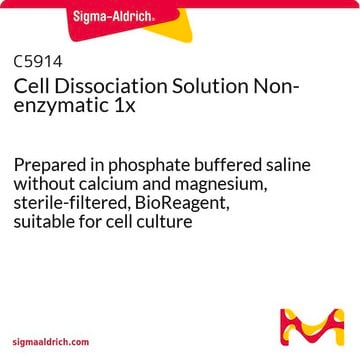SF006
ESGRO Complete Accutase
The ESGRO Complete Accutase is a cell detachment solution of proteolytic & collagenolytic enzymes, qualified for use for the detachment of mouse embryonic stem cells cultured in serum-free conditions with ESGRO Complete Clonal Grade Medium.
Sinônimo(s):
Stem Cell Tested Accutase
Faça loginpara ver os preços organizacionais e de contrato
About This Item
Código UNSPSC:
12352207
eCl@ss:
32160801
NACRES:
NA.75
Produtos recomendados
Nível de qualidade
forma
liquid
fabricante/nome comercial
Chemicon®
técnica(s)
cell culture | stem cell: suitable
entrada
sample type: mouse embryonic stem cell(s)
sample type induced pluripotent stem cell(s)
Condições de expedição
dry ice
Descrição geral
ESGRO Complete™ Accutase is a cell detachment solution of proteolytic and collagenolytic enzymes that has been qualified for use for the detachment of mouse embryonic stem cells cultured in serum-free conditions with ESGRO Complete Clonal Grade Medium (Cat. No. SF001-500). Accutase does not contain mammalian or bacterial derived products.
Aplicação
Cell Detachment:
1. Thaw Accutase® to room temperature.
2. Wash plate, flask or beads with sterile PBS.
3. Add Accutase to culture dish or flask using aseptic procedures at 10 mL per 75 cm2 surface area.
4. Return culture to 37°C incubator and allow cells to detach (5-10 minutes).
5. Count cells and passage as usual. No additional washes or enzyme inhibitors are required.
1. Thaw Accutase® to room temperature.
2. Wash plate, flask or beads with sterile PBS.
3. Add Accutase to culture dish or flask using aseptic procedures at 10 mL per 75 cm2 surface area.
4. Return culture to 37°C incubator and allow cells to detach (5-10 minutes).
5. Count cells and passage as usual. No additional washes or enzyme inhibitors are required.
forma física
Frozen sterile liquid, ready to use formulation. Each lot is tested for Sterility (by USP membrane filtration method), enzymatic activity (tested with synthetic chromagenic tetrapeptides) and cell detachment from tissue culture plastic.
1X Accutase® enzymes in Dulbecco′s PBS containing 0.5 mM EDTA•4Na and 3 mg/L Phenol Red.
1X Accutase® enzymes in Dulbecco′s PBS containing 0.5 mM EDTA•4Na and 3 mg/L Phenol Red.
Armazenamento e estabilidade
Stable when stored at -20°C. Refer to lot expiration date on label. Recommended storage upon receipt is -20°C. After thawing, Accutase® may be stored for up to 2 months at 4°C. DO NOT STORE AT ROOM TEMPERATURE.
Informações legais
Accutase is a registered trademark of Innovative Cell Technologies, Inc.
CHEMICON is a registered trademark of Merck KGaA, Darmstadt, Germany
cOmplete is a trademark of Roche
Código de classe de armazenamento
12 - Non Combustible Liquids
Classe de risco de água (WGK)
WGK 1
Ponto de fulgor (°F)
Not applicable
Ponto de fulgor (°C)
Not applicable
Certificados de análise (COA)
Busque Certificados de análise (COA) digitando o Número do Lote do produto. Os números de lote e remessa podem ser encontrados no rótulo de um produto após a palavra “Lot” ou “Batch”.
Já possui este produto?
Encontre a documentação dos produtos que você adquiriu recentemente na biblioteca de documentos.
Os clientes também visualizaram
Darren A Cusanovich et al.
Cell, 174(5), 1309-1324 (2018-08-07)
We applied a combinatorial indexing assay, sci-ATAC-seq, to profile genome-wide chromatin accessibility in ∼100,000 single cells from 13 adult mouse tissues. We identify 85 distinct patterns of chromatin accessibility, most of which can be assigned to cell types, and ∼400,000
Lina Dahl et al.
PloS one, 3(4), e2025-e2025 (2008-04-24)
The molecular mechanisms regulating the expansion of the hematopoietic system including hematopoietic stem cells (HSCs) in the fetal liver during embryonic development are largely unknown. The LIM-homeobox gene Lhx2 is a candidate regulator of fetal hematopoiesis since it is expressed
Na Suo et al.
Glia, 67(7), 1320-1332 (2019-03-01)
Oligodendrocytes (OLs) are the myelinating glia of the central nervous system. Injury to OLs causes myelin loss. In demyelinating diseases, such as multiple sclerosis, the remyelination is hindered principally due to a failure of the oligodendrocyte precursor cells (OPCs) to
Thangaselvam Muthusamy et al.
Stem cell reports, 3(1), 169-184 (2014-07-30)
We describe the use of a characteristic blue fluorescence to identify and isolate pluripotent human embryonic stem cells and human-induced pluripotent stem cells. The blue fluorescence emission (450-500 nm) is readily observed by fluorescence microscopy and correlates with the expression of
Elena Vezzoli et al.
The Journal of clinical investigation, 129(6), 2390-2403 (2019-05-08)
A disintegrine and metalloproteinase 10 (ADAM10) is implicated in synaptic function through its interaction with postsynaptic receptors and adhesion molecules. Here, we report that levels of active ADAM10 are increased in Huntington's disease (HD) mouse cortices and striata and in
Nossa equipe de cientistas tem experiência em todas as áreas de pesquisa, incluindo Life Sciences, ciência de materiais, síntese química, cromatografia, química analítica e muitas outras.
Entre em contato com a assistência técnica



![[Pd(OAc)2]3 reagent grade, 98%](/deepweb/assets/sigmaaldrich/product/structures/508/249/99a0ef2c-b77c-4d73-8ed9-0cca05b6b41f/640/99a0ef2c-b77c-4d73-8ed9-0cca05b6b41f.png)






